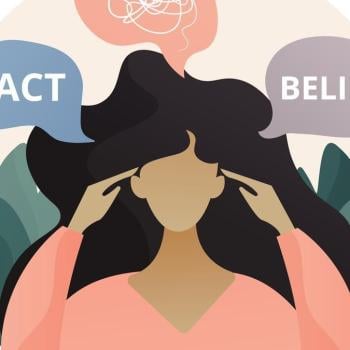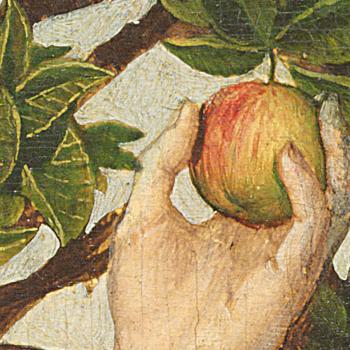
“Our Most Important Relationship Is Not With God” was stated to me by a wonderful, spiritual lady called Deb from the church I was attending in Alabama, in 2003. I was taken aback, but Deb walked closely with the Lord and I trusted her, so I wanted to hear more. Her theory was that our most important relationship is with ourselves, because how we view ourselves defines the extent to which we can know God. In other words, our view of ourselves is the gatekeeper of our relationship with God. Over the years, I’ve found that Deb had a point. I’ll give you an example:
In 1996 I was in Kowloon, training to become a missionary and deckhand on an ocean-going ship, which travelled from port to port, sharing the Gospel. I had only recently learned the things of the Spirit, but had quickly and passionately embraced spiritual gifts and divine power. The Lord’s gaze is on those in captivity, his eyes afire with the promise of liberty, and I wanted to be part of the jail break. I was young and impassioned, and gathered around me those who were similarly motivated, and we became a community of seekers among the wider missionary community. At the risk of being immodest, I was one of three unofficial leaders of the group. It just worked out that way.
One night we gathered on a rooftop to pray for a release of the Spirit, and I felt the urging of the Lord to climb up on my friend, Øyvind’s shoulders (he was the tallest among us) and punch the sky, as a prophetic symbol of breaking open a hole in Heaven, that its blessings would rain down on us. Theologically that is rather dubious, but our intentions were good, and God honoured them. That night, we experienced a uniform blessing of the Holy Spirit across the entire group. Simultaneously, everyone started having powerful experiences of God’s love. It was a tremendous blessing, and I was honoured to be used by God throughout the time of prayer, delivering prophetic messages and ministering in power. At the end of the evening, everybody left except myself and Øyvind, who was my best friend.
We sat on the edge of the roof and I wept – not with joy, because of all the Lord had done, but in sorrow, because while everyone else had been communing deeply with God, I had felt nothing of his love for me. My heart had not cried ‘Abba’, nor had I been comforted or encouraged by his personal touch. In that moment, I felt utterly empty.
Looking back on it now, I understand what was going on. Despite believing that God is infinitely loving, I was unable to receive his love for me, because I thought so badly of myself. I was very much a broken young person, with a low self-image and little care for my own wellbeing. As is the case with so many believers with similar issues, I had thrown myself into spirituality with abandon, because it gave me a sense of purpose. It distracted me from the pain of self-loathing, and kept me from dealing with the issues festering on the inside.
Eventually, this came to a head in a catastrophic mental breakdown that I’ve written of before. I had placed what psychologists call ‘conditions of worth’ on myself that were too heavy to bear. If I wasn’t being spiritually productive in some capacity, my sense of worth was close to zero. In other words, my worth was conditional on my performance. Breakdown is inevitable, for a young person who thinks like that. For others the crash might be less extreme, and be labelled ‘burnout’, and for yet others it might lead to the loss of faith, when they discover the toxicity of fevered, unbalanced spirituality, and rush for the exit. This deeply saddens me. If young people understood their immense value to God, and their inestimable worth as human beings, simply by existing and being who they are, they would not go to spiritual extremes, burn out, and reject the faith that seemed to take them there.
In truth, any ‘conditions of worth’ are destructive, whether spiritualised or not, and people of all stripes can burn out, but spirituality offers an experience of intimacy and power so intense that it is easy to abuse it like a drug, rather than flow with it in the balance and leading of the Holy Spirit. We need to address the holes in ourselves, if we are ever to be balanced and healthy. For those who were brought up in perfect homes of consistent affirmation, encouragement and love, these holes might not exist, but for the rest of the human race, healing is needed.
The painful truth is that, as Christians, we often do this to ourselves. We teach self-neglect from youth onwards. As a young man, I was exposed to certain passionate individuals who were convinced that secular music was ‘of the Devil’. This was a big deal in the Eighties, and I remember hearing of it from the pulpit, as well as from individuals. What is more important to a young person than music? It was music that gave me an identity as a teenager, working out who I was and what I liked. My best friend Jim and I used to hang out in his parents’ cellar, which had been turned into a chill-out zone by his artistic, older sister Sally, and listen to tunes. It was there, in those deep, comfortable chairs, surrounded by Sally’s murals and bathed in coloured light, that I learned to love Bob Marley, the Beatles, Jimmy Hendrix, Dillinger, Al Green, Led Zeppelin, Bob Dylan, the Stone Roses, and a thousand other bands and artists. Music brings out passion in young people, and it helped me develop as a person, and yet in church I would hear that this was of the Devil, and to be shunned.
To cut a long story short, the cognitive dissonance this created in me became a years-long battle, which culminated in the throwing of my CDs into the trash, as a sacrifice to God. How many Christian young people have been through this experience? Certainly, many of my generation did, and I’d be amazed if it doesn’t happen today. We devalue that which makes us happy, out of a false sense of piety. I’m sure there is some music out there which is harmful to specific individuals, but in general, music is a gift from God, to be enjoyed, whether or not it is written by a Christian. As a young believer, I learned to ignore my own needs, reject my own comfort, and destroy that which meant a lot to me. In other words, I was taught that loving God meant neglecting and rejecting myself.
I had a friend called Steve who was a tremendously gifted footballer, but he gave it up because, in his eyes, it had become an idol. He experienced real joy, motivation and passion when playing sport, and those deep, wonderful emotions exposed the lack of the same in his spirituality. Playing football made him realise he loved sport more than God. Rather than answer the difficult question posed – why is my spirituality so dissatisfying? – he gave up that which made him happy. He chose to abandon himself, as a perceived act of service.
I’ve seen this happen with young Christians at school and at university, jettisoning the things that make them who they are, and which bring them joy. I knew a young athlete, whose talents seemed to be exceptional, but they rejected a career in sport because getting there meant training eight hours a day, and in their eyes that was idolatry, because God would want that time for himself.
In all these ways, we have taught young people to ignore their own needs, subdue a desire for pleasure and satisfaction, and undermine their development, as an act of service. We have also robbed the world of many talented adults. Who knows what these fabulous young people could have achieved, if encouraged to grow in their God-given gifts?
Added to this, self-loathing has become embedded into common Christian theology – many believe we are loathsome, disgusting, and worthless, and are only loved by God because of Christ. I’ve written of the fallacious nature of such doctrines in two pieces, When First I Knew, and A Glimpse of Grace. We are all in need of forgiveness, yes, and we have all fallen short of the glory of God, but we are not loathsome, awful creatures. In his wisdom, God made each of us in his image, and he does not make dross. We are all beautiful, the manifestation of a divine dream, and even when our lives are twisted into ugly, broken shapes, God sees our infinite value. Every human being is a divine masterpiece in need of restoration.
I recognise that, these days, many congregations will not propagate some of the ideas above, but it is self-evident that these loveless dogmas, traps and beliefs still permeate the Church. There is still poison in the pot. If we are to be a light to the world, and pierce the reality of people’s lives with divine love, we must address and root out unloving ideas about God and the life of faith.
Jesus stated that the second greatest commandment, which is in itself an expression of our love for God, is to love others as ourselves. The command contains the assumption that we love ourselves, and that we ought to treat others in the wonderful way we treat ourselves. By implication, if we do not love ourselves, we have no chance of loving others as Jesus intended, when he spoke these words. So you see, loving oneself (what psychologists would call positive self-regard) is of the highest importance, because if we do not love ourselves, we have no idea what it means to love others.
If loving ourselves is so important, what does it look like? For every person, it will be different, so I can only speak from personal experience. For me, it is making time for the things that make me happy, such as roaming around antiques shops, or hunting for treasures in thrift stores (we call them charity chops in the UK). It’s taking a walk with my darling Chanel along a river or round a lake, going out for a delicious meal, hanging out with friends, attending live music events, and reading a good book, among other things. Loving myself means creating time and room for the things that make me feel alive.
Looking after my body is an important act of self-love. I’m not talking about extremes – hard diets, hours of exercise, and the abolishment of treats and pleasures. I’m talking about eating a sensible amount of fruit and vegetables, and going for a daily walk. These small adjustments can be powerful ways to love oneself, if done over an extended period of time. They also become a pleasure, in and of themselves.
Loving ourselves isn’t complicated. It requires no expert knowledge. It just means listening to our hearts and treating ourselves with respect.
Looking back on that rooftop prayer meeting, I feel sorry for that young man, and for anyone like him. The elevated knowledge of God’s presence and the deep plunge into self-loathing is an unhealthy, roller-coaster experience, which sets young people up for a major fall, or at the very least, the abandonment of faith. We need to teach young people that they are wonderful, not just because God has chosen to love them, but because he made them lovely in the first place. We ought to encourage them in their natural gifts, speak highly of their innate value, simply for being who they are, and see the image of God in each of them. If we speak worth to them, they will value themselves as God values them, and be empowered to love others as they love themselves. They will know balance from the outset, and have the best chance to live a life full of love, without burnout or breakdown.
We are not merely vessels for service; we are objects of divine delight. Psalm 139: 14,
‘I will praise You, for I am fearfully and wonderfully made;
Marvellous are Your works,
And that my soul knows very well.’
















